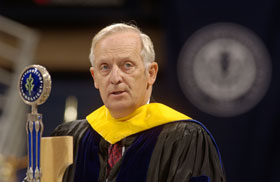Acid Rain Expert Accepts Visiting Appointment
 |
| Gene Likens, an ecologist and educator, gave last year’s graduate Commencement address. He recently accepted an appointment from the Board of Trustees as a visiting Distinguished Research Professor. |
|
File Photo |
The man best known for identifying acid rain has accepted an appointment from the Board of Trustees as a Distinguished Research Professor (visiting) in the Department of Ecology and Evolutionary Biology.
Gene Likens, an expert on the biogeochemistry of forest, stream, and lake ecosystems and the ethics of conservation, is director of the Institute of Ecosystem Studies in Milbrook, N.Y.
He will spend two weeks at UConn each fall for the next five years, offering seminars and giving public lectures. This fall, his seminar will focus on ethics and communication in the sciences. As a sought-after consultant on national and international issues, Likens has considerable experience in both areas. The seminar will be announced in the fall and will be open to the public. He will also hold informal discussions at lunchtimes and will be available to meet with students and faculty during his stay on campus.
Likens is famous for his work in the forests of New Hampshire that led to recognition of the severe impacts of acid rain and the origin of the acidified rain: industry in the Midwest and southern Canada.
His initial discoveries of acid rain damage to Hubbard Brook in New Hampshire’s White Mountains in the 1960’s led to a 50-year study of the area, measuring long-term changes in soil chemistry, tree growth, and stream water biology.
“Gene Likens is a world figure in the key field of ecosystems ecology,” says Gregory Anderson, professor and head of the ecology and evolutionary biology department. “He is also a very effective teacher and communicator, as well as a warm and approachable person.”
Born in Pierceton, Ind., Likens earned a bachelor’s degree in biology from Manchester College in North Manchester, Ind. He earned his master’s and Ph.D. degrees in zoology at the University of Wisconsin-Madison. He has held faculty appointments at Dartmouth College, Rutgers University, Cornell University and, since 1984, at Yale. Concurrently, from 1983 to 1993, he was vice president of the New York Botanical Garden and founding director of the Institute of Ecosystem Studies and director of the Mary Flagler Cary Arboretum, in Millbrook, N.Y. Since 1993 he has been director and president of the Institute of Ecosystem Studies. He also holds the institute’s G. Evelyn Hutchinson Chair in Ecology.
Likens, a member of the National Academy of Sciences since 1981 and the American Academy of Arts and Sciences since 1979, was awarded the 2001 National Medal of Science. He also has been elected to the presidency of four national or international professional societies. He has authored, co-authored, or edited 16 books and published more than 500 articles.
“His professional output is spectacular,” Anderson says. “More importantly, the papers, talks, etc. are of significance. When one can change a whole field, it is clear the work is prodigious in content as well.”
Likens has been an advisor to governments and government leaders both in the United States and in several other countries.
“We believe his association with us will bring not only an expansion of academic expertise, but also the opportunity for our students and faculty to interact with someone who has extensive experience effectively infusing science policy into government,” Anderson says.
Likens, who received an honorary degree and spoke at the graduate Commencement ceremony in 1994, also came to UConn in 1998 as a speaker in the Teale lecture series on nature and the environment.
“Professor Likens will add stature to a very fine department and to our University,” says Ross MacKinnon, dean of the College of Liberal Arts and Sciences, which provided funding for the appointment.

